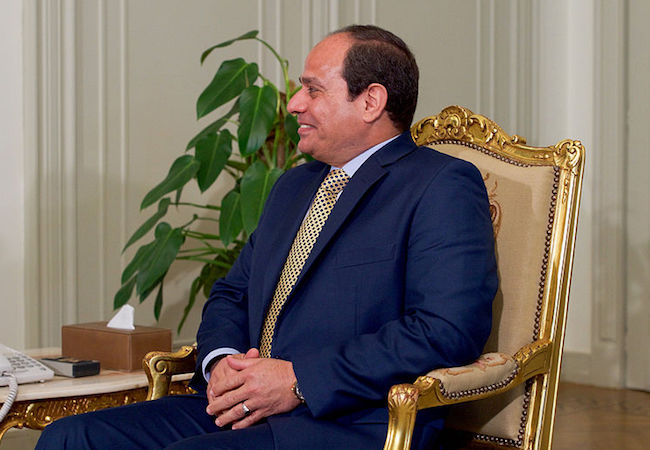
By Moustafa Youssef
In his most recent speech, General Al-Sisi threatened millions of Egyptians living in very humble homes with minor permit violations, that the army forces will destroy these houses unless these citizens pay an atrociously high fine. 90% of the Egyptian population would not be able to pay. According to Gary Libecap in his paper published by Hoover Institute in 2018 “Property rights are the most fundamental institution in any economy and society. They determine who makes decisions about valuable resources and who captures the economic gains from those decisions; they mold the distribution of income, wealth, and political influence; they set time horizons and investment incentives; and they define who will take part in markets. These attributes are well recognized among economists for spurring economic growth”
The Egyptian government is suffering from a huge deficit due to the effect of covid-19 on tourism and oil prices, which hits Al-Sisi’s biggest supporter United Arab of Emirates and Saudi Arabia and decrease their abilities to support the military regime in Egypt. Al-Sisi has no other way to support his regime; so, he imposes high taxes on Egyptian.
Successful development economic experiments such as Botswana and Rwanda in Africa, or Singapore in Asia, have focused on transparency, worked very hard against corruption, and invested in human capital. In contrast, the Mafia’s way of running countries is to enslave people, threatening them and imposing very high taxes with no benefits or investments in education or healthcare. Evident examples of this model are Egypt and old military regimes in South America: Chile -Augusto Penuche and Argentina- Jorge Videla. This Mafia approach is the worst scenario any country can be ruled with, and its consequences can be very dramatic.
By not encouraging foreign direct investments and new investors to restore the unmaintained infrastructure, Al-Sisi’s government has utilized the country’s already limited resources in non-productive projects such as the bypass of the Suez Canal which cost the country over $12 billion. The launch and celebration for this expansion cost over $10 million. No international investor will take the tremendous risk of investing in a country ranked 125 out of 128 countries according to the World Justice Project Rule of Law Index. In the 2020 index rating, Egypt experienced the largest average annual percentage drop in the rule of law, -4.6%, which is alarming and warning to any investor as a avoid approaching this kingdom of dictatorship.
Egypt under Al-Sisi’s regime received very generous aid from the two wealthy governments in Saudi Arabi and the United Arab Emirates. Democracy is fatal to both United Arab of Emirates and Saudi Arabia dictatorships. Saudi Arabia is well known as a country that not only detains citizens who show some signs of political opposition, but also hires and sends official professional assassins to slaughter and chop off journalists as the crown prince Muhammad Bin Salman MBS did to The Washington Post columnist Jamal Khashoggi. United Arab of Emirates is one of the worst countries in human right. Together, they spent more than $50 billion to suppress the Arab spring and prevent the creation of any democratic state in the Middle East, most of those funds found their way to the pockets of corrupt generals.
According to the World Happiness Report 2019, Egypt ranked 137 out of 156 countries, ranking it as one of the least happy places to live in the world. The number of people living under poverty rose to almost one-third of the Egyptians in 2018 due to the high inflation rates and continued drastic declining of government expenditure on healthcare and education.
Instead of investing in its human capital, this regime invested government funds in a Utopian capital, created mainly for the elite, with a hefty cost of $90 billion. Al-Sisi ordered his army to have the latest technology of infrastructure and a man-made river in this new administrative capital which costs 35 billion Egyptian pounds. He asked to have a latest technology monorail with a cost more than 51 billion Egyptian pounds. He demanded a new presidential palace approxemitaley10 times the size of the white house. Al-Sisi promised Egyptians that the new administrative capital will have Africa’s highest tower, largest mosque and largest church. In order to achieve these world records, Al-Sisi government borrowed heavily in an unprecedented manner. In July 2013 at the time of the coup, the external debt was $43 billion, and by July 2020 it increased to over $124 billion. During the same period, domestic debts jumped from $90 billion, to $278 billion. The Egyptian government is addicted to debt, and the debt-to-GDP ratio is increasing every year in rates drastically greater than the growth rate of the national economy.
Today’s Egypt is in a very unpredictable situation. The Middle East region is in dire need for social justice and socio-economic development, initiated and supported by people and for the people. Ignoring this catastrophic situation invites disaster throughout the entire region and beyond, since the situation in Egypt throughout history is known to affect the surrounding region. If the situation in Egypt continues this way, Egypt will be on the edge of a cliff. This may lead to tens of millions of illegal immigrants flowing out to Europe. Hundreds of thousands of very poor suffering Egyptians may easily be recruited to join radical and extremist organizations, in addition to the misery of millions in Egypt suffering from the continuous ordeals. The free world needs to stop Al-Sisi and his regime to prevent this unaffordable crisis before the whole region collapses.
*Every $1 equal to 15.80 Egyptian pounds
Moustafa Youssef is the Director of Global Development Studies Center (GDSC)




